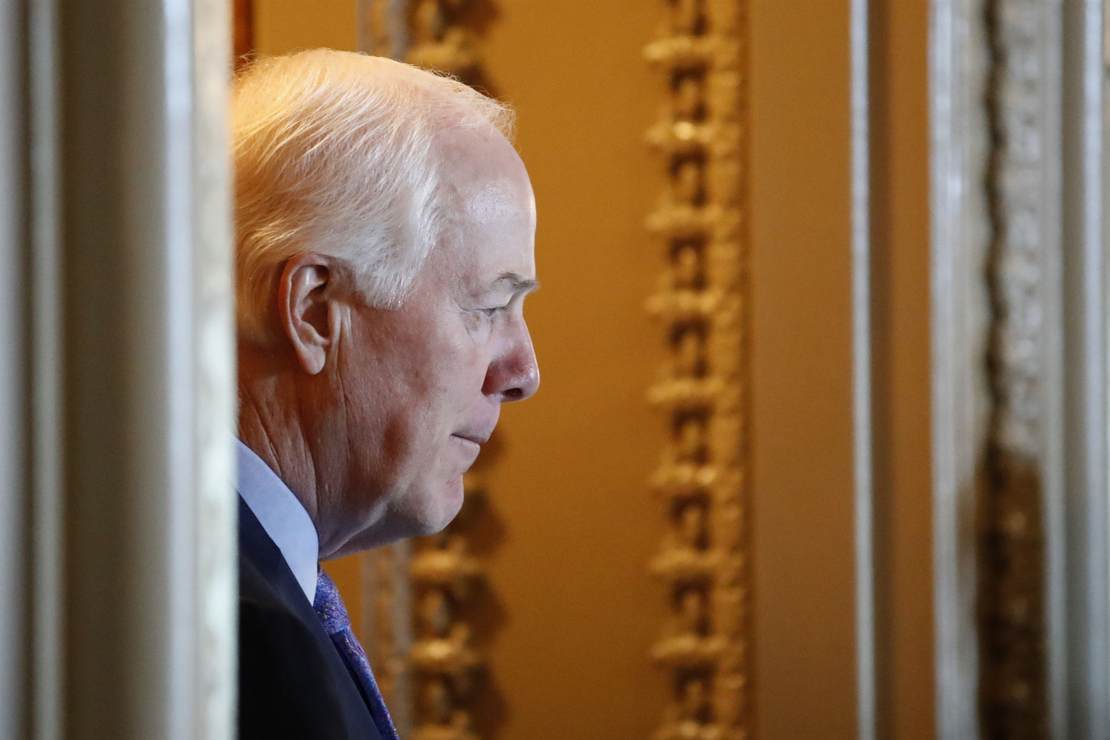
The “serious doubts” have eased. The legislative text is out. Procedural action could come as soon as tonight.
They’re really going to do it, it seems.
Chris Murphy sounds triumphant:
“For 30 years … mass shooting after mass shooting, Congress did nothing. This week we have a chance to break this 30-year period of silence … We are prepared to do … something that saves lives.”
— Sen. Chris Murphy (D-CT) on the bipartisan gun reform framework pic.twitter.com/7EDdiIP0a8
— The Recount (@therecount) June 21, 2022
The sticking points were the “boyfriend loophole” barring domestic abusers from owning guns and the breadth of federal grants to the states to reduce the risk from dangerous people. John Cornyn, the lead GOP negotiator, wanted the grant money to be made available to fund all manner of treatment programs for addicts and the mentally ill; Democrats wanted the funds targeted at encouraging the states to set up their own red-flag systems to block certain gun purchases. If WaPo’s reporting is accurate, Cornyn ended up winning that battle of wills: “According to a summary of the draft bill, an existing Justice Department grant program would be expanded to allow funding for state ‘crisis intervention programs,’ including not only red-flag laws but also drug courts and veterans’ courts.”
It’s hard for me to believe any red state will pass a red-flag law if it can access the same pool of federal “crisis intervention” money without doing so. Which makes that a pretty clear victory for gun-rights supporters and a potential sore spot for gun-grabbers.
The left isn’t going to like the “boyfriend loophole” compromise either. Currently, you’re prohibited from owning a weapon if you’ve been convicted of misdemeanor domestic violence — but only if you’re married to the victim, live with her, and/or have a child with her. If you’re dating but not cohabiting, you can purchase guns even after committing misdemeanor DV. Per WaPo, the two sides tried to get together on a definition of “dating” but decided in the end to let the courts figure it out when interpreting the new statute. (Although it has to mean something more intimate than “casual acquaintanceship or ordinary fraternization in a business or social context.”) The important compromise had to do with making the loss of an offender’s gun rights temporary, though: Henceforth, under the bill, you can’t buy a gun for five years if you commit misdemeanor domestic violence against the woman you’re dating. After five years, if you’ve stayed out of trouble, you can start buying guns again.
Progressive reaction is what you’d expect:
Republicans successfully secured the following concession:
After you are CONVICTED of beating up your girlfriend, your right to own a firearm is AUTOMATICALLY RESTORED after five years
Thank goodness someone is looking out for men who beat up their partners https://t.co/0PiNc1iyhw
— Judd Legum (@JuddLegum) June 21, 2022
READ RELATED: Giuliani lawyer: How dare Liz Cheney accuse him of being drunk on election night
The most contentious provision in the final bill is one that’s flown under the radar in media coverage because virtually everyone thinks it’s a good idea. We’ve had federal background checks for years as a condition to purchasing from a licensed dealer; it stands to reason that those background checks should also include juvenile records, to alert gun dealers if they’re selling to someone with a history of dangerous behavior. That’s especially important with gun buyers aged 18-21 since many aren’t old enough yet to have amassed a meaningful criminal record as an adult but may have an extensive record as a minor.
Under the bill, juvenile records will be included in background checks of under-21 buyers going forward. But — here’s the contentious part — those checks will include a three-day waiting period for purchases that could extend to 10 days in certain circumstances. Charles Cooke, a gun-rights advocate, is irate, calling the bill a “disaster” as a result. Republicans are giving Democrats an inch, he warns, knowing that they’re destined to try to take a mile:
The Republicans who negotiated this deal — “deal” — may see adding a federal waiting period for under-21-year-olds as a narrow exception to the general rule, but the Democrats will not. Within an hour of that measure becoming law, the Chris Murphys of the world will start calling it the “waiting period loophole” and asking in faux confusion why we apply it to Americans aged between 18 to 21 but not to everyone else. And the press, of course, will follow suit.
Worse yet, the GOP will have helped set the precedent that the federal government may micromanage the purchasing process. The 1993 Brady Bill contained a waiting period, but it was valid only until the instant background check system was ready, and then it immediately disappeared. This would restore that system for a subset of buyers. At present, the federal government’s role in regulating firearms purchases is limited to running checks. Once expanded, it will be extremely tough to put it back in its proper place. Is that what John Cornyn wants?
Point taken, but according to WaPo the new waiting period is an administrative necessity. Recordkeeping for juveniles is too messy and haphazard across the 50 states to get a reliable instant result once they’re incorporated into the federal background check system. For the system to work, there’ll have to be a waiting period for the under-21s — in the near term. The good news for gun-rights supporters is that the provision comes with a sunset provision, however. If you’re worried about giving the Dems an inch and such that they scheme to take a mile, know that the bill requires them up front to eventually give that inch back:
[B]ecause of disparate state systems and standards for searching and maintaining juvenile records, negotiators struggled with the mechanics of that provision.
The bill will include an “enhanced search” window for gun buyers under 21 to allow local authorities to scour confidential databases, according to the bill summary, with a total of ten business days available to complete a review of those young buyers if an initial search raises a potentially disqualifying issue.
While that structure stands to be especially contentious for gun rights advocates, who have long opposed the prospect of creating a de facto waiting period for purchasing a gun, the “enhanced search” provision is set to expire after 10 years — after which, the bill’s architects envision, juvenile records will be routinely incorporated into the existing instant background-check system.
Seems like a … more or less reasonable compromise? Bear in mind too that, given the magnitude of the red wave that’s coming this fall, it’ll be years before Democrats have total control of government again and are in a position to tinker with the “enhanced search” provisions. And even when they do have it, do we think this is an issue they’ll be prepared to eliminate the filibuster in order to pass? How popular would a mandatory three-day waiting period for all adult gun buyers be in purple states like Pennsylvania and Michigan?
How eager were Dems to act unilaterally on guns with their current narrow congressional majority?
Murphy would happily take a mile from this inch if he could. But the fact that he’s heralding the thin gruel of this bill as a major victory makes me think he understands there are no legislative “miles” for his party to gain going forward, only inches. Maybe centimeters, depending on how the next two election cycles go.
Here’s Kyrsten Sinema, one of the lead negotiators alongside Murphy, taking her own victory lap.
Today, we finalized bipartisan, commonsense legislation to protect America’s children, keep our schools safe, and reduce the threat of violence across our country. Our legislation will save lives and will not infringe on any law-abiding American’s Second Amendment rights. 1/2 pic.twitter.com/wpfnzzkcO0
— Kyrsten Sinema (@SenatorSinema) June 21, 2022
Source:






